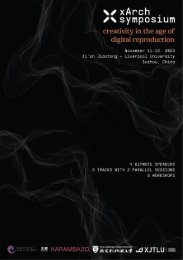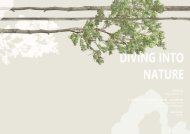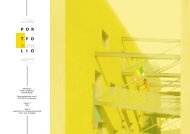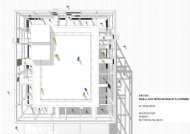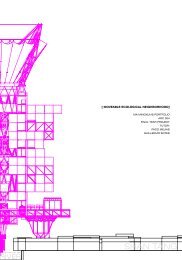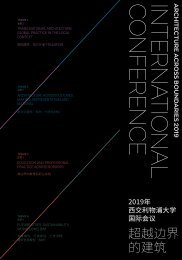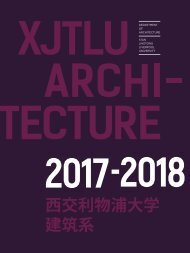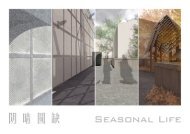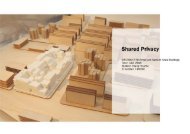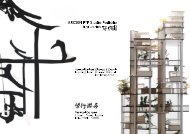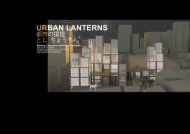YEARBOOK 2018 - 2019 | XJTLU DEPARTMENT OF ARCHITECTURE
The sixth edition of the yearbook of the Department of Architecture at Xi'an Jiaotong-Liverpool University presents student works created during the academic year 2018 - 2019. The yearbook exemplifies the new model for Chinese architectural education for which the department was commended by the Royal Institute of British Architects (RIBA). It is also a showcase of the creative culture that has guided our students towards successful international careers as responsible and creative architectural designers. The Department of Architecture at XJTLU offers RIBA Part 1, 2 and 3.
The sixth edition of the yearbook of the Department of Architecture at Xi'an Jiaotong-Liverpool University presents student works created during the academic year 2018 - 2019. The yearbook exemplifies the new model for Chinese architectural education for which the department was commended by the Royal Institute of British Architects (RIBA). It is also a showcase of the creative culture that has guided our students towards successful international careers as responsible and creative architectural designers. The Department of Architecture at XJTLU offers RIBA Part 1, 2 and 3.
Create successful ePaper yourself
Turn your PDF publications into a flip-book with our unique Google optimized e-Paper software.
255<br />
SUSTAINABLE TOURISM DEVELOPMENT IN MAURITIUS<br />
256<br />
<strong>2018</strong>-<strong>2019</strong> <strong>YEARBOOK</strong> Xi’an Jiaotong-Liverpool University Department of Architecture 西 交 利 物 浦 大 学 建 筑 系<br />
Islands destinations are usually portrayed as remote locations, of small size and limited population, resources. It is the unique cultural features,<br />
ecosystem and a pristine environment that typically differentiate islands from other types of tourist destinations. The direct and indirect benefits<br />
that tourism involve is the potential to make positive contribution to social and cultural developments. However, tourism, coupled with worldwide<br />
processes of urbanisation and globalisation has often led to cultural and social erosion, jeopardising cultural identity of a country or specific area.<br />
This phenomenon, which has been observed in many countries, is gaining global attention due to its increasing frequency and the erosion or loss of<br />
many cultures.<br />
Mauritius, a small island in the Indian ocean was not spared by these processes. The tourism industry started in the 1950s when there was a need<br />
for economic diversification and the creation of employment. The island was known as having the potential attractive ‘3S’ (sun, sea and sand),<br />
which was considered as an important factor for attracting tourist at that time. Consequently, the island has witnessed a rapid growth of tourism<br />
development expanding all over the coast of the island, where in the past few decades, Mauritius experienced a flourishing tourism industry.<br />
However, these developments have not always brought positive impacts and the country faces several challenges affecting the social, economic<br />
and environmental stability.<br />
As a consequence, this research design proposal, encompassing both the studio and thesis writing, consists of exploring and providing a new model<br />
of sustainable tourism development for Mauritius. The project will consist of finding a suitable approach to providing opportunities for the local<br />
population’s access to their natural heritage by respecting their local culture.<br />
STUDENT<br />
Purmah Ghashil Singh<br />
Paco Mejias Villatoro<br />
TUTORS<br />
Christiane Margerita Herr




